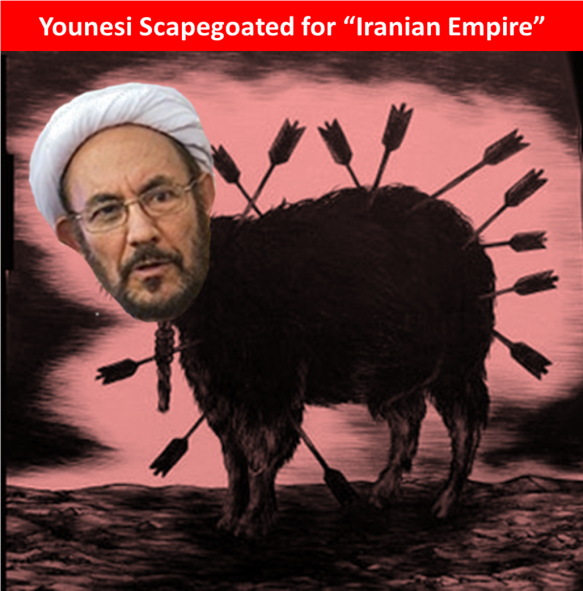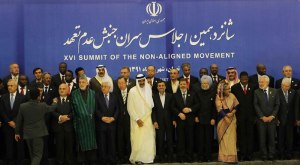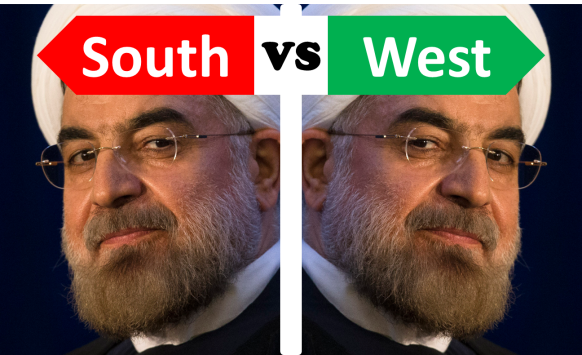Following on the path of Javad Zarif’s op-ed in the New York Times to “rid the world of Wahabbism”, Hassan Rouhani’s speech at the NAM meeting in Venezuela was filled with cynical half-truths and lies which are totally irrelevant of the facts. In fact, he sounded as if he is the president of a neutral country such as Sweden or Switzerland and not a country which is fueled by a strategy of expansionism, is involved in two proxy wars, is accused of numerous efforts to meddle in its neighbors affairs, is openly supporting terrorist organizations, is increasing the sectarian Shiite-Sunni divide, is oppressing women and sectarian/religious minorities etc…
Rouhani’s speech is all “peace and love” but is devoid of being factual:
- Tehran is fighting “against extremism and terrorism” – Anyone mention Hezbollah, Islamic Jihad and even al-Qaeda and the Taliban? OK, so one man’s terrorist is another man’s freedom fighter, but doesn’t it bother Rouhani that Hezbollah is designated as a terrorist organization even by the Arab League? And doesn’t it seem strange that Tehran is supporting al-Qaeda (before and after 9/11)?
- Tehran rejects the “hegemonic and domineering inclinations” of superpowers – OK but this obviously doesn’t include Moscow, of course, which has become Tehran’s BFF . Rouhani obviously knows that Russia is a superpower and yet, he doesn’t have qualms in allowing Russia to support Assad in his civil war while incessantly warning the US to stay out of the conflict. Perhaps what he really means is “Western superpowers”…that makes more sense.
- Tehran rejects the support of the “West together with the East” – That was Khomeini’s motto to keep Iran unaligned and independent. Since then, the regime in Tehran has never looked to the West but wait, isn’t Moscow in the East? And isn’t Beijing, another superpower being wooed by Tehran also in the East?
- Tehran is always ready to help out the “righteous” – Ahhhhhhhh…define “righteous”. Tehran’s definition of the “righteous” just happens to be Shiites and anti-Americans wherever they may be. That doesn’t include Syrian civilians who sided with the rebels against Assad (184,000 deaths to date). It also doesn’t include Yemenites who sided with the government against the Houthis. That doesn’t include the members of the Iranian resistance wherever they may be.
- Tehran does not interfere “in the internal affairs of “other countries” – Yeah, yeah…Let’s start with Lebanon which has become a satellite state of Tehran through the empowering of Hezbollah. Move on to Syria in which Tehran chose to support Assad who doesn’t represent all of the Syrian people since the start of the civil war which was sparked by his unwillingness to hold free national elections. How about supporting the Houthi rebels in Yemen to overthrow the government there? Or empowering Shiite militants in Bahrain, Saudi Arabia, the UAE, Kuwait, and Nigeria? Not interfere? Tehran is the king of the “Meddle East“.
- Tehran is avoiding “wounds inflicted every day on innocent bodies” – Wow…he obviously forgot about include the hundreds of thousands of civilian victims of Assad, Hezbollah, the Iranian army and Russia in Syria and the thousands of victims of Houthi rebels in Yemen. It also doesn’t include the 30,000 political prisoners who were massacred in 1988 by the regime. Oh, and the thousands of Iranians who are imprisoned, interrogated, tortured, flogged and executed for not toeing the regime’s line.
- Tehran operate on a “policy of moderation, prudence and interaction to settle conflicts” – So that’s what it’s called. “Moderation” and “prudence” explain Tehran’s military involvement in Syria and in Yemen. They also explain Tehran’s meddling and subversive efforts in Bahrain, Kuwait and Saudi Arabia. Wait…Saudi Arabia…yep, “moderation” and “prudence” explains the latest vicious rhetoric by Khamenei and the rest of the regime vilifying the Saudi leadership and the Saudi religion.
- Tehran is a “pioneer in engaging in dialogue and talks” – OK, that really depends when the “pioneering” began. Until Rouhani was elected, Tehran consistently rejected any dialogue with the West since 1979. Ahmadinejad’s presidency was notorious for ignoring calls to negotiate and antagonizing possible negotiating partners. Tehran ignored the calls of the IAEA and the UN to hammer out a nuclear deal for years. Perhaps Rouhani should have said “pioneer since 2013”. That’s about right.
- Tehran is trying to create a “new order” through “cooperation and the collective participation of all the neighbors” – What “new order”? Well, as Zarif pointed out, Iran is different from all countries because it wants to change the “international order”. By this he was referring to the goal and duty, imbedded within the Iranian constitution, to Export the Revolution to the “oppressed”. And then there’s the Global Islamic Awakening against the West or the New Islamic Civilization Khamenei loves to fantasize about. And how about the “cooperation and collective participation”? The people of Syria didn’t ask to import the new order, neither did the government of Yemen and Saudi Arabia and the Gulf States aren’t exactly “cooperating” with Iran in developing such a “new order”.
- Tehran is against “interference of outside powers” in internal affairs – Whaaaaaaaaaaaat? Tehran? Against interference? What’s really peculiar is that Tehran doesn’t see itself as “interfering” nor does it see itself as an “outside power”. And yet Tehran is “interfering” as an “outside power” in Lebanon, Syria, Yemen, Iraq, Bahrain, Saudi Arabia etc…. Hell, it even invited the “interference” of an “outside power” when it agree to allow Moscow to support Assad in his civil war. Seriously, how can “Exporting the Revolution” not interfere with governments who do not want such a revolution to occur in their countries?
Are you getting the picture here? Rouhani is telling the NAM states what they want to hear: That Tehran is run by a peace-loving regime, is unaligned with any super-power, is fighting extremism and terrorism and is averse to interfere in any country’s internal issues. With such a great message, who cares about the facts?
Mr. Rouhani, it’s OK to believe that if you repeat the same lies enough times, people will believe you. But if you don’t take responsibility for your problems and weaknesses, at some point, your credibility is bound to plunge. Just as in the case of Zarif’s attack on Wahabbism, it’s easy to agree with many of the points that you shared in your speech – if all nations, including Iran, would act according to how you described your regime’s purported guidelines, the world would definitely be a better place to live in. Until then, remember, you can fool some of the people some of the time but you can’t fool all the people all the time.
Related articles:
- khameneis-glass-house-syndrome-on-terrorism
- is-tehran-addicted-to-terror
- tehran-redefines-terrorism
- iran-not-big-enough-for-tehran
- iran-selectively-obsessed-with-the-oppressed
- tehrans-revolutionary-allies
- khamenei-today-it-is-islams-turn
- lebanon-iraq-resist-becoming-irans-provinces
- islam-divided-over-hezbollah
- tehran-supports-assad-not-syrians
- tehran-looking-everywhere-but-west
- iranian-irony-over-bahraini-sheikh
- tehran-furious-over-ncri-terrorist-rally-in-paris
- the-strategy-of-illusion-in-tehran
- tehran-unites-muslim-enemies-instead-of-uniting-islam
- syrians-and-yemenites-caught-in-the-middle
- tehran-tries-to-justify-the-1988-massacre
- zarifs-hypocrisy-increases
- tehran-meddling-hypocrisy-over-al-nimr
- zarif-scores-points-but-loses-credibility
- syria-key-to-iran-and-to-russia
- iranian-involvement-in-syria-escalates-alarmingly
- tehran-blatantly-hypocritical-on-syria
- kurds-openly-fighting-tehran








